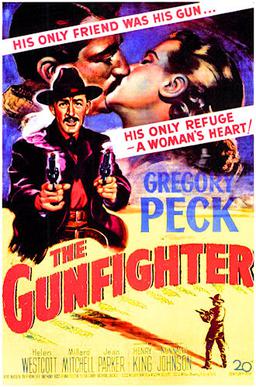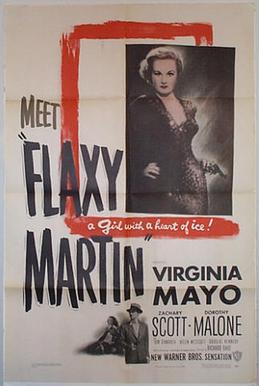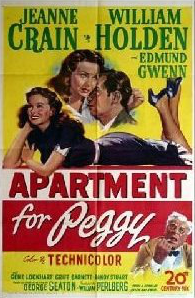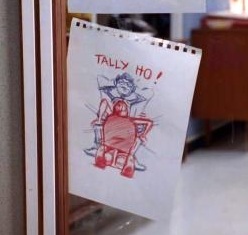
Peggy Sue Got Married is a 1986 American fantasy comedy-drama film directed by Francis Ford Coppola starring Kathleen Turner as a woman on the verge of a divorce, who finds herself transported back to the days of her senior year in high school in 1960. The film was written by husband-and-wife team Jerry Leichtling and Arlene Sarner.

The Gunfighter is a 1950 American Western film directed by Henry King and starring Gregory Peck, Helen Westcott, Millard Mitchell and Karl Malden. It was written by screenwriters William Bowers and William Sellers, with an uncredited rewrite by writer and producer Nunnally Johnson, from a story by Bowers, Roger Corman, and screenwriter and director Andre de Toth. The film was the second of King's six collaborations with Peck.

Flaxy Martin is a 1949 film noir starring Zachary Scott and Virginia Mayo, and featuring Elisha Cook Jr., Dorothy Malone, and Douglas Kennedy. The crime thriller was directed by Richard L. Bare based on a story written by David Lang.

Words and Music is a 1948 American biographical musical film loosely based on the creative partnership of the composer Richard Rodgers and lyricist Lorenz Hart. The film stars Mickey Rooney as Hart and Tom Drake as Rodgers, along with Janet Leigh, Betty Garrett, Ann Sothern and numerous musical stars. It was the second in a series of MGM biopics about Broadway composers; it was preceded by Till the Clouds Roll By and followed by Three Little Words and Deep in My Heart.

Kid Millions is a 1934 American musical film directed by Roy Del Ruth, produced by Samuel Goldwyn Productions, and starring Eddie Cantor. Its elaborate "Ice Cream Fantasy Finale" production number was filmed in three-strip Technicolor, one of the earliest uses of that process in a feature-length film.

The Arrangement is a 1969 American drama film directed by Elia Kazan, based upon his 1967 novel of the same title.

Rhapsody is a 1954 American musical drama film directed by Charles Vidor and starring Elizabeth Taylor, Vittorio Gassman, John Ericson, and Louis Calhern based on the 1908 novel Maurice Guest by Henry Handel Richardson.
Blue Moon is a 2006 Philippine romantic drama film. Directed by Joel Lamangan, it stars Eddie Garcia, Christopher de Leon, Boots Anson-Roa, Mark Herras, Dennis Trillo, and Jennylyn Mercado. It was released by Regal Films.

Good Morning, Miss Dove is a 1955 American CinemaScope drama film that tells the sentimental story of a beloved schoolteacher who reflects back on her life and former students when she is hospitalized. It stars Jennifer Jones, Robert Stack, Kipp Hamilton, Robert Douglas, Peggy Knudsen, Marshall Thompson, Chuck Connors, and Mary Wickes.

Marco Polo is a 1982 American-Italian television miniseries originally broadcast by NBC in the United States and by RAI in Italy. It stars Kenneth Marshall as Marco Polo, the 13th-century Venetian merchant and explorer. The series also features appearances by Denholm Elliott, Anne Bancroft, John Gielgud, Burt Lancaster, Ian McShane, Leonard Nimoy, and others. It was originally broadcast in four episodes, where episodes 1 and 4 were twice as long as episodes 2 and 3. The series is sometimes divided into six equally long episodes.

Invisible Stripes is a 1939 Warner Bros. crime film starring George Raft as a gangster unable to go straight after returning home from prison. The movie was directed by Lloyd Bacon and also features William Holden, Jane Bryan and Humphrey Bogart. The screenplay by Warren Duff was based on the novel of the same title by Warden Lewis E. Lawes, a fervent crusader for prison reform, as adapted by Jonathan Finn.

Neptune's Daughter is a 1949 American Technicolor musical romantic comedy film released by Metro-Goldwyn-Mayer starring Esther Williams, Red Skelton, Ricardo Montalbán, Betty Garrett, Keenan Wynn, Xavier Cugat and Mel Blanc. It was directed by Edward Buzzell, and features the debut of the Academy Award–winning song "Baby, It's Cold Outside" by Frank Loesser.

City for Conquest is a 1940 American epic drama film directed by Anatole Litvak and starring James Cagney, Ann Sheridan and Arthur Kennedy. The picture is based on the 1936 novel of the same name by Aben Kandel. The supporting cast features Elia Kazan, Anthony Quinn, Donald Crisp, Frank McHugh, Frank Craven and Lee Patrick.

Now I'll Tell is a 1934 American pre-Code drama film directed by Edwin J. Burke starring Spencer Tracy, Helen Twelvetrees, and Alice Faye. It was produced by Fox Film shortly before the company's merger with Twentieth Century Pictures. It marked the final screen appearance of former silent star Alice Calhoun.

Apartment for Peggy is a 1948 American comedy-drama film directed by George Seaton and starring Jeanne Crain, William Holden, and Edmund Gwenn. The plot is about a depressed professor whose spirits are lifted when he rents part of his home to a young couple. It was based on the novelette An Apartment for Jenny by Faith Baldwin. Campus exteriors were filmed at the University of Nevada, Reno.

It's a Date is a 1940 American musical film directed by William A. Seiter and starring Deanna Durbin, Kay Francis, and Walter Pidgeon. Based on a story by Jane Hall, Frederick Kohner, and Ralph Block, the film is about an aspiring actress who is offered the lead in a major new play, but discovers that her mother, a more experienced actress, was hoping to get the same part. Their lives are complicated further when they both get involved with the same man. Distributed by Universal Pictures, It's a Date was remade in 1950 as Nancy Goes to Rio.

"The Summer Man" is the eighth episode of the fourth season of the American television drama series Mad Men, and the 47th overall episode of the series. It aired on the AMC channel in the United States on September 12, 2010. The episode was written by series creator Matthew Weiner and writers Janet Leahy and Lisa Albert. It was directed by Phil Abraham.

Ed Blumquist is a fictional character and one of the lead protagonists from second season of the FX produced television series, Fargo. He is created by Noah Hawley and portrayed by Jesse Plemons, who was nominated for the Primetime Emmy Award for Outstanding Supporting Actor in a Limited Series or Movie for this role.

















